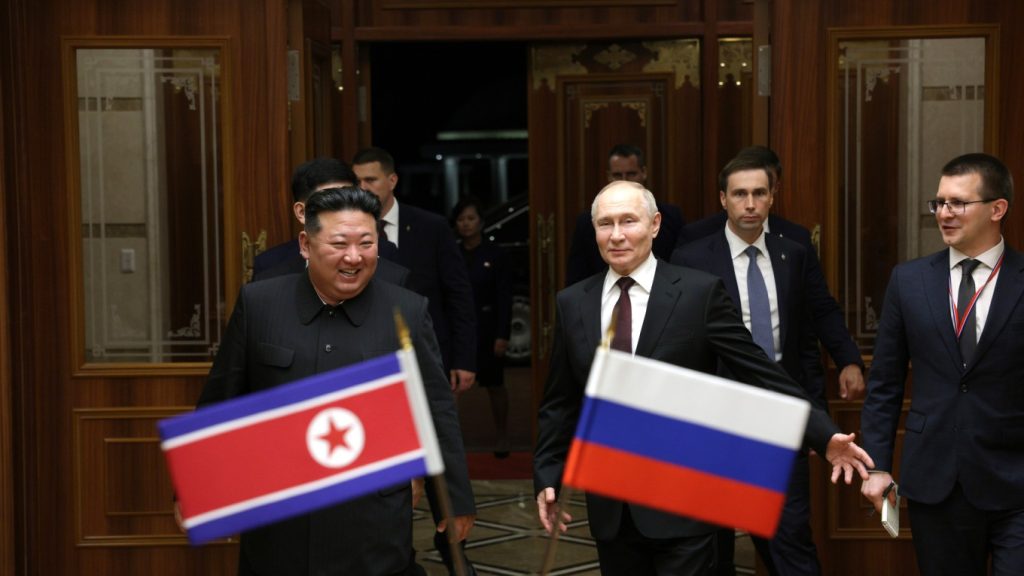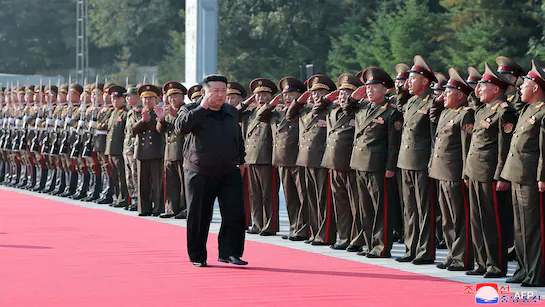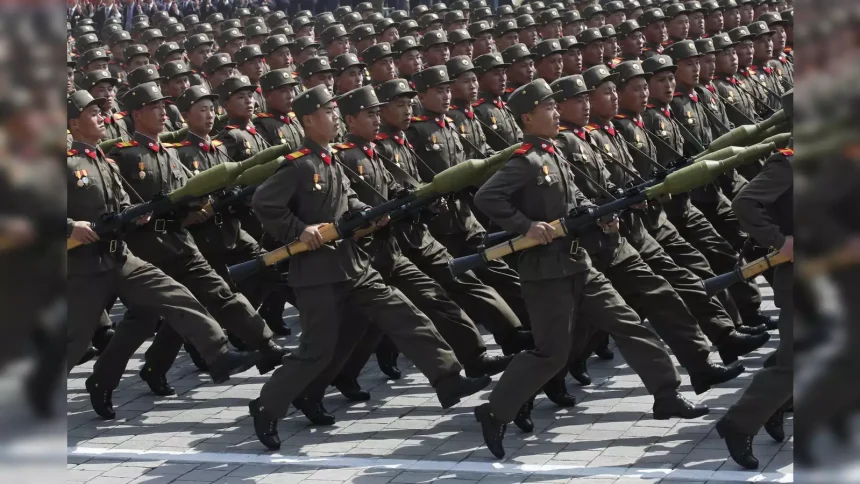In a dramatic move that intensifies the geopolitical landscape, North Korea has begun deploying thousands of soldiers to Ukraine’s front lines, cementing a controversial military partnership with Russia. This unprecedented deployment, Pyongyang’s first large-scale overseas troop movement, signals a strengthening of military ties between Kim Jong Un’s regime and Moscow, while potentially reshaping the security dynamics on the Korean Peninsula.
According to Seoul’s National Intelligence Service (NIS), approximately 1,500 North Korean special forces soldiers are already acclimatizing in Russia, poised to join the war effort in Ukraine. Thousands more are expected to follow, solidifying Pyongyang’s military involvement in a foreign conflict. This marks a significant shift in North Korea’s international military strategy, and experts warn that the consequences could reverberate far beyond the battlefields of Ukraine.
The deployment stems from a defense agreement signed in June between North Korean leader Kim Jong Un and Russian President Vladimir Putin, a pact that includes a mutual defense clause. At the time, some analysts questioned whether the deal would translate into concrete action. Now, with boots on the ground in Ukraine, it’s clear the agreement was more than just a symbolic gesture.
“This establishes a framework where Russia’s intervention or military support will automatically occur if North Korea is attacked or faces a crisis,” said Hong Min, a senior analyst at the Korea Institute for National Unification, in an interview with AFP. This binding military alliance means that any attack on North Korea could potentially trigger Russian involvement, raising concerns about the future of peace and stability in the region.
The North Korean troop deployment underscores just how “solid” the Putin-Kim deal really is, according to Hong. It represents a turning point in the alliance between Pyongyang and Moscow, who have been inching closer amid their shared animosity toward the West. North Korean soldiers fighting alongside Russia in Ukraine not only bolsters Moscow’s military capacity but also highlights Pyongyang’s willingness to expand its military presence beyond the Korean Peninsula.

For Russia, this influx of troops could be critical. As the war in Ukraine drags on, Moscow has been looking for ways to reinforce its efforts, particularly in maintaining control over occupied territories and possibly making further territorial gains. The arrival of North Korean special forces may provide Russia with the additional manpower it needs to solidify its hold on regions it has seized.
But the ramifications of this partnership extend beyond Ukraine. By aligning itself militarily with Russia, North Korea is positioning itself as a more integral part of Moscow’s strategic calculations. Kim Jong Un may be hoping that this collaboration will evolve into a more comprehensive military deterrent, perhaps mirroring the US-South Korea alliance that has been a cornerstone of security in East Asia for decades.
READ ALSO: NASA Study Hints at Possible Life Beneath Mars’ Ice Surface
North and South Korea have remained technically at war since the Korean conflict ended in 1953 with an armistice rather than a peace treaty. Over the years, Kim Jong Un has built up an arsenal of nuclear weapons, while South Korea, lacking its own nuclear deterrent, relies on the so-called US nuclear umbrella for protection. Joint military drills between Seoul and Washington, a routine feature of this alliance, consistently anger Pyongyang, which views them as rehearsals for invasion.
The deployment of North Korean soldiers to Ukraine could signal Kim’s desire to establish a more formidable military alliance with Russia, paralleling the defense partnership between South Korea and the United States. Such an alignment could lead to a significant shift in the security balance on the Korean Peninsula, with far-reaching consequences for regional stability.
Hong Min points out that a strengthened North Korea-Russia military relationship could increase the pressure on South Korea and its allies. “Kim could be hoping to create a more integrated North Korean and Russian military deterrent, akin to the US-South Korea alliance, potentially resulting in a significant shift in the Koreas’ security dynamics,” he said.
This move may also send a message to the international community, particularly to Washington and Seoul, that Pyongyang is not isolated and has the backing of a powerful ally in Moscow. The presence of North Korean troops on the front lines in Ukraine complicates the global security equation, linking two distant theaters of conflict—the war in Ukraine and the long-standing tensions on the Korean Peninsula—in new and unpredictable ways.
As North Korean soldiers prepare to fight in Ukraine, the world is watching closely. This unprecedented deployment not only deepens Pyongyang’s ties with Moscow but also drags Russia further into the intricacies of Korean Peninsula security. The Putin-Kim alliance, now more than just a paper agreement, has the potential to reshape military alliances in both Europe and Asia.
The international community will have to navigate this new reality with caution. As North Korea becomes more involved in global conflicts, its military capabilities and alliances grow, presenting new challenges for diplomacy and peacekeeping efforts. With the stakes higher than ever, the actions of Kim Jong Un and Vladimir Putin will undoubtedly be scrutinized as world leaders seek to avoid further escalation in an already volatile global landscape.

In the end, North Korea’s decision to send troops to Ukraine reflects a calculated move to secure greater leverage on the world stage, all while deepening its partnership with a fellow adversary of the West. How this alliance will evolve, and what it means for future conflicts, remains to be seen. But one thing is clear: the world is entering uncharted territory.
Ukraine’s state-run Centre for Strategic Communication recently released a video that appears to show North Korean soldiers at a Russian military camp, preparing to join the conflict in Ukraine. The footage has fueled speculation about Pyongyang’s deepening military ties with Moscow.
Experts suggest this deployment offers North Korea’s elite troops a chance to experience modern warfare and test their home-grown weaponry on the battlefield. Analysts believe Kim Jong Un’s decision to send soldiers could be an attempt to boost his international standing, especially with US elections approaching.
For Russia, North Korea’s involvement addresses critical manpower shortages in both its military and labor forces. At the same time, Pyongyang seems to be shifting its foreign policy focus away from traditional partners like China, Japan, and South Korea, signaling a prolonged state of tension on the Korean Peninsula.

